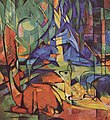Expressionism
Expressionism is an art and cultural movement of the 20th century. Expressionist artists try to express a feeling with what they create. Colours and shapes are not used in a way people see them, but as the artist feels them.
Expressionism emerged as an 'avant-garde movement' in poetry and painting before the First World War. In the Weimar years it was appreciated by a mass audience,[1] peaking in popularity in 1920s Berlin.
Expressionism presents the world as subjective: how the artist feels it, not how it is scientifically. The art looks to get an emotional effect, and transmits personal moods and ideas.[1][2] Expressionist artists sought to express the meaning of "being alive"[3] and emotional experience rather than physical reality.[3][4]
Expressionism is exhibited in many art forms, including: painting, literature, theatre, dance, film, architecture and music. The term often implies emotional angst. In a general sense, painters such El Greco could be called expressionist; in practice, the term is applied only to 20th century works.
The Expressionist stress on the individual perspective was also a reaction to positivism and other artistic movements such as naturalism and impressionism.[5]
Typical modern expressionists are Edvard Munch (The Scream), August Macke, Ernst-Ludwig Kirchner, Emil Nolde, Marc Chagall, and others. The First World War, with the many young men who died, left deep impressions on artists' minds.
-
Fugue by Wassily Kandinsky (1914)
-
Portrait of Eduard Kosmack by Egon Schiele
-
Rehe im Walde by Franz Marc
-
"Elbe Bridge I" by Rolf Nesch
-
To the unknown voice, by Kandinsky 1915.
-
Clouds in Finland by Konrad Krzyżanowski, 1908
References
[change | change source]- ↑ 1.0 1.1 Bruce Thompson, University of California at Santa Cruz. lecture on Weimar culture/Kafka's Prague
- ↑ Chris Baldick Concise Oxford Dictionary of Literary Terms, entry for 'Expressionism'
- ↑ 3.0 3.1 Victorino Tejera 1966. Art and human intelligence. Vision Press, London. 85, 140
- ↑ The Oxford Illustrated Dictionary. 1976, 294
- ↑ Garzanti, Aldo (1974) [1972]. Enciclopedia Garzanti della letteratura (in Italian). Milan: Guido Villa. p241







